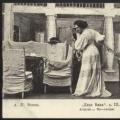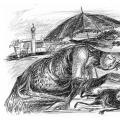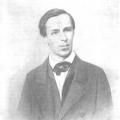Possessive case in English (Possessive Case). Possessive case of a noun in English
Possessive Case
The possessive case in English is used to indicate ownership.
If the noun is in the singular, then to form the possessive case, the ending "-"s" is added to it, and if in the plural, then only an apostrophe is added.
Use of the possessive case
1. Animated objects.
The possessive case is used mainly with nouns denoting animate objects.
The student "s room - student's room;
the students" room - student room;
the student "s books - student's books;
the students" books - student books.
The possessive case can refer not only to a single noun, but to the whole group of a noun.
My girlfriend's family - my girlfriend's family;
the Russian President's decree - a decree of the President of Russia.
The possessive case is often used with names.
Jack's coat - Jack's coat;
Donald's house - Donald's house;
Maxwell's equations - Maxwell's equations.
If the name ends in "s", then the possessive case can be formed either in the usual way, i.e. add "-"s", or add only an apostrophe.
Doris" [ˈdɒrɪsɪz] dress - Doris' dress;
Doris "s [ˈdɒrɪsɪz] dress - Doris's dress.
The name Doris "and Doris" s in the possessive case is read the same way, with the ending [ɪz].
2. Inanimate objects.
Nouns denoting inanimate objects can also take the possessive form. Below are some of them.
2.1 World, nature, water, earth and others.
The Earth's gravity - the gravity of the Earth;
water "s edge - water edge;
2.2 Cities, countries, seasons, months.
Moscow "s streets - Streets of Moscow;
summer "s day - summer day;
Germany "s policy - German policy.
January "s frost - January frost.
2.3 Distance, time.
Yesterday's news - yesterday's news;
a kilometer "s distance - a distance of one kilometer.
Absolute form of the possessive case
The absolute form of the possessive case example:
I spent the summer at my grandmother "s. - I spent the summer with my grandmother.
After a noun in the absolute form of the possessive case, there is no other noun.
The absolute form of the possessive case can be used when indicating a place.
At my grandmother "s - at my grandmother's;
at the hairdresser "s [ˈhɛəˌdrɛsəz] - at the hairdresser.
"s or of apply?
The possessive case indicates possession. In the possessive case, the ending "-"s" is used. But ownership can also be indicated using the "of" form.
Ann's bag
the bag of Ann
There are no hard and fast rules when to use "-"s" and when to use the "of" form to indicate ownership.In general, options with "-"s" look more natural.
Often the "-"s" form is used when the possessing noun denotes animate object. This is the norm in cases:
1. When real ownership is indicated:
2. Indication of action or quality:
The student's work is excellent.
Both examples can be rearranged with the preposition "of", which leads to the logical separation of the nouns "pencil" and "work":
The pencil of Ann.
The work of the student is excellent.
The variant with "of" is used necessarily if the form with "-"s" gives a different meaning to the sentence.
A noun in English has two cases: common (Common Case) and possessive (Possessive Case).
Common case have all nouns; this is the form in which it is given in the dictionary. In the general case, the noun has no special ending.
Noun in possessive indicates belonging, answers the question Whose? - Whose? and performs the function of defining in relation to another noun.
form possessive case usually have animate nouns denoting a living being to which some object, quality or attribute belongs. It is formed by ending -s, preceded by an apostrophe: the girl girl— the girl 's bag girls bag. If the noun is expressed in plural, formed in the classical way, namely, by adding the ending -s or -es, then only apostrophe -ʼ: her relatives' housethe house of her relatives.
According to the rules of English grammar, a noun in the possessive case takes place before the noun for which it serves as a definition. In Russian, it is transmitted through the genitive case or the possessive adjective. The following shows different ways of expressing the possessive case in English.
If the noun ends in -s, then there are two options | Dicken s ′ novels = Dickens ′ s novels Dickens novels |
If the plural noun ends in -s, then the possessive case is formed by adding an apostrophe | worker s′ caps workers caps, cat s′ paws cat paws, nurse s′ toys babysitter toys |
Nouns that do not have a plural ending -s, in the possessive case acquire the ending -s preceded by an apostrophe | children 's toys children's toys, men 's coats men's coat women 's umbrellas female umbrellas |
If the object or sign belongs to several persons, then the apostrophe and the ending -s are placed after the last of them, but if each separately, then after each | Ilf and Petrov 's novel Shelly 's and Byron 's poems |
In compound nouns, apostrophe and ending -s placed after the last element | the teacher of art 's room art teacher room, the sister-in-law 's bag |
Inanimate nouns usually do not have a possessive case | the roof of this house roof this at home |
There are, however, cases of using inanimate nouns in the possessive case | a mile 's distance distance in a mile, a month's holiday holiday on the month, a five days trip five-day the trip, the world 's resourcesworld resources, the Earth 's rotationrotation Earth |
Absolute use of the possessive case | a dog of my friend 's dog my friend, at her grandmother's at ( her) grandmothers, at the baker 's in bakery |
The noun can serve definition to another noun and in the case when it stands before it in the general case, that is, without any change in its form. Such a noun is translated into Russian by an adjective or a noun in one of the oblique cases: cane sugar cane sugar, sugar cane sugarcane, life insurance life insurance, payment agreement payment agreement, cotton market cotton market, tin trade tin trade.
In many cases, the noun is preceded by not one, but two or more nouns in the role of attribute. Some of them are translated into Russian adjectives, and others — nouns in one of the indirect cases: home market prices domestic market prices, meat price decrease reduction in the price of meat. Accordingly, if there are several nouns in a row in a sentence, the last one is the main one, and the previous ones are its definitions: state power system —system state power.
Noun preceded numeral, which serves as a definition, usually stands in the singular form: the five years plan five year plan, a ten-year old girl ten year old girl, a ten-pound note ten pound note.
If you liked it, share it with your friends:Join us atFacebook!
See also:
We offer online tests:
In English, nouns have only two cases: possessive case (Possessive Case), in which nouns take a special ending and general case (Common Case), in which nouns do not have any endings.
Common case is the form in which the noun is given in the dictionary.
Majority value Russian case forms is transmitted in English in the form of the common case with or without a preposition:
In English, nouns in common case can be used in the functions of the subject and direct object (always without a preposition), indirect and prepositional objects, circumstance (usually with a preposition), definitions (both with and without a preposition).
Possessive nouns in the only number is formed by adding the ending to the noun ‘s:
Possessive nouns in plural number is formed by adding only one apostrophe:
If the plural of a noun is formed not by adding the ending /s/, but by changing the form, then the possessive case is formed in the same way as for the singular, i.e. adding the ending / ‘s/:
A noun in the possessive case has only one function - definitions(individual characteristic of the word being defined):
The possessive construction can be presented with the preposition of:
the boy' s room = the room of the boy
3. Possessive case of animate and inanimate nouns:
Basically, only animated a noun denoting a living being to which an object, quality or attribute belongs:
Rare cases of using the possessive case with inanimate nouns are limited to the meaning of a particular subject:
the car ‘s roof - car roof(specific, specific machine)
4. Cases of using the possessive case for inanimate nouns:
- Nouns denoting time and distance:
- Nouns denoting countries, cities and courts, as well as words: world, country, city, ship:
- Some adverbs of time:
- The word being defined has other determiners - the indefinite article or demonstrative pronouns:
- Phrases without a noun:
- To name an institution, shop, or home (of someone):
Two nouns in the possessive case usually do not follow one another. In such cases, the suggestion of:
| He is the friend of my brother ‘s wife | He is a friend of my brother's wife. |
In the following video clip, children show the belonging of objects to each other, and the teacher pronounces a sentence using nouns in the possessive case:
English Joke
A young man hired by a supermarket reported for his first day of work. The manager greeted him with a warm handshake and a smile, gave him a broom and said, "Your first job will be to sweep out the store."
"But I'm a college graduate," the young man replied indignantly.
"Oh, I'm sorry. I didn't know that,” said the manager. "Here, give me the broom - I'll show you how."
There are only two cases in English: common ( common case) and possessive ( possessive/ genetive case).
Common case nothing is indicated on the letter (compare: in Russian, each of the six cases has its own ending), but the meaning of phrases and sentences is clear to us due to the strict word order in the sentence and the use of prepositions. Let's take an example. "The teacher said "Hello" to the pupils". - ""The pupils said "Hello" to the teacher". In the translation into Russian, we change the word order and use cases of the Russian language for translation: said to the teacher - said (to whom?) to the teacher, Dative case; written by Pushkin - written (by whom?) by Pushkin, instrumental case.
Possessive used to show ownership. To form the possessive case, we add the ending -"s" to the animate noun in the singular, in the plural just an apostrophe -".
For example, Julia "s lipstick - Julia's lipstick, a boy" s bag - a boy's bag, pupils "books - students' books, a driver" s license - a driver's license / driver's license.
As you can see, most often the possessive case is translated into Russian as the genitive case.
Features of the use of the possessive case
It would seem that forming the form of the possessive case is as easy as shelling pears, but there are pitfalls here too.
1. If the noun is singular, add -"s, even if the noun ends in -s, for example, a waitress"s uniform, an actress"s salary.
Doubts about this arise when writing proper names: St. James "s Park - St. James's Park (in London), Charles" s car - Charles's car, Doris "s party - Doris' party. But we just add an apostrophe to the names of famous and famous people. For example, William Yeats "poetry - the poetry of William Yeats (Irish poet and playwright), Socrates" son (son of Socrates).
2. If the noun is plural, add only an apostrophe. For example, girls" skirts, the parents" apartment. But if the plural noun is irregular (see irregular plural nouns), then add -"s. For example, sheep "s wool, the men" s club, children "s toys.
3. Add - "s only to the last noun, if there are several, or to the last element of a complex noun. For example, my friend Nataly" s keys are the keys of my friend Natasha, Mary "s new friends are Masha's new friends, her mother-in -law "s house - the house of her mother-in-law.
4. When it comes to the workplace, shop, office, home, after - "s the second noun can be omitted. For example, I was at the doctor" s yesterday. (=at the doctor "s office). I am at my grandmother"s (= at my grandmother"s house). I need to go to the baker"s (=baker"s shop, bakery) / the florist"s (flower shop) / the confectioner "s (confectionery) / at the dry-cleaner" s (in the laundry).
5. If the noun refers to the whole phrase, then this phenomenon is called Group Genitive. Let's take an example.
Helen and Bob "s car (they have one car for two).
The man I saw yesterday "s son (son of the man I saw yesterday).
Someone else's benefit (someone else's benefit).
A friend of mine "s bad habit (my friend's bad habit).
What about inanimate nouns?
When we want to show that something belongs to an inanimate object, use the preposition "of": the leg of the table. But native speakers prefer a shorter version, that is, a complex noun without a heap of articles: the table leg.
If it is impossible to form a compound noun, then we use the preposition "of". For example, the top of the box. Such expressions must be memorized. Experienced linguists feel whether a phrase sounds or not. When in doubt, use "of". In many cases, both forms are correct. For example, the hand of the clock (clock hand) = the clock hand.
Set expressions with inanimate nouns in the possessive case
These expressions must be memorized.
|
Temporary expressions |
an hour "s journey - two hours" journey, a day "s work - two days" work, a month "s salary - two months" salary, today "s newspaper, journey" s end |
|
|
Distance |
a mile "s distance, two miles" distance |
|
|
Countries, cities |
Chicago's theaters, Poland's industry |
|
|
With words world, earth, nation, country, city, town |
world "s best museums, our country" s best opera house, city's roads, the earth "s surface |
|
|
With words ship, car |
the ship "s company / crew (crew of the ship), the car's speed |
|
|
With words nature, water, ocean, river (the variant without -‘s is used equally, for example, ocean waves) |
the river "s edge, ocean's temperature |
|
|
Names of months and seasons(the variant without -‘s is used equally). When talking about specific private events, the apostrophe is definitely needed (see Swan, Michael. 1997. Practical English Usage. OUP) |
Summer's day, July's holidays |
|
|
planet names |
Saturn's rings, Pluto's satellites |
|
|
Newspapers, organizations |
the government "s decision (government decision), the company" s success (company success), the factory "s gate (factory gate) |
|
|
Idiomatic expressions |
|
P.S. The possessive case of a noun in English is a difficult topic to study, because students are trying to draw a parallel with the Russian language, where nouns have 6 cases, but there is no possessive, but there are possessive pronouns. In English, the possessive case expresses belonging and nothing more. In fact, everything is very simple.
 Uncle Vanya the plot of the play. "Uncle Ivan. Attitude towards the professor of others
Uncle Vanya the plot of the play. "Uncle Ivan. Attitude towards the professor of others Little Tsakhes, nicknamed Zinnober
Little Tsakhes, nicknamed Zinnober Maikov, Apollon Nikolaevich - short biography
Maikov, Apollon Nikolaevich - short biography